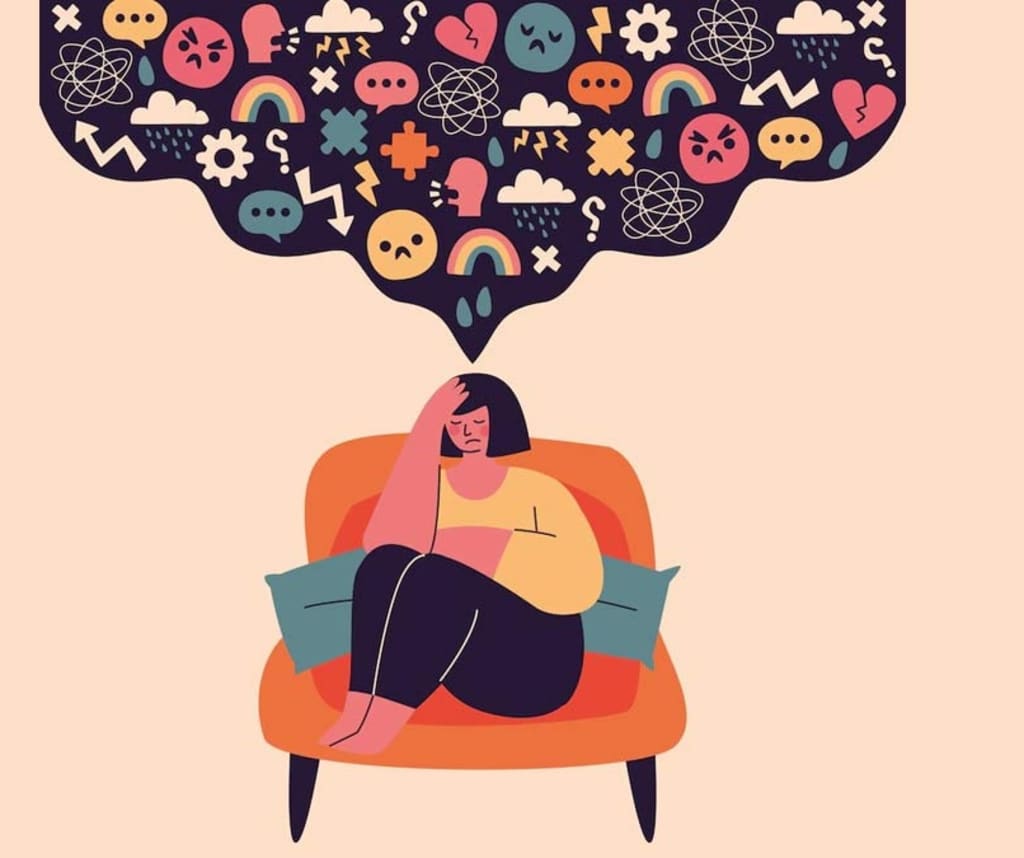The Impact Of Social Media On Mental Health
Positive and Negative Impacts of Social Media

Social media refers to online platforms and tools that allow individuals and groups to create, share, and exchange information, ideas, and content with each other. It typically involves the use of technology and the internet to facilitate communication and interaction between people in various forms, such as text, images, videos, and audio. Examples of social media platforms include Facebook, Instagram, Twitter, YouTube, LinkedIn, and TikTok, among others. Social media has become an integral part of modern communication and has a significant impact on the way people connect, share information, and build relationships.
Importance of social media on mental health
The impact of social media on mental health is an important topic because of the widespread use of social media platforms and their influence on the well-being of individuals. Social media has become an integral part of modern life and has transformed the way people interact, communicate, and access information. While social media can have positive impacts on mental health, such as providing social support and access to mental health resources, it can also have negative effects, such as increased risk of cyberbullying, addiction, anxiety, and depression.
Understanding the impact of social media on mental health is important because it can inform the development of effective strategies for promoting mental health and well-being in the digital age. By identifying the factors that contribute to negative impacts and promoting healthy social media habits, individuals, and communities can minimize the risks associated with social media use. Additionally, social media companies can use this information to create safer and more inclusive platforms that prioritize the well-being of their users. Ultimately, the impact of social media on mental health is an important area of research and action that can have significant implications for public health and well-being.
Purpose of social media on mental health
The purpose of social media on mental health is to provide individuals with a platform to connect with others, share experiences, and access mental health resources. Social media can provide a sense of social support and community, which can have positive effects on mental health and well-being. It can also serve as a tool for self-expression and creativity, allowing individuals to share their thoughts, feelings, and experiences with a wider audience.
However, the purpose of social media on mental health is not always positive. Social media can also have negative impacts on mental health, such as increased risk of cyberbullying, addiction, anxiety, and depression. The purpose of addressing these negative impacts is to promote healthy social media habits and to minimize the risks associated with social media use. This can involve strategies such as setting boundaries and limiting screen time, cultivating healthy social media habits, and seeking professional help and support when needed.
Ultimately, the purpose of social media on mental health is to create a safer and more inclusive digital environment that prioritizes the well-being of its users. By understanding the impact of social media on mental health and promoting healthy social media habits, individuals, communities, and social media companies can work together to create a more positive and supportive online space for all.
Positive impacts of social media on mental health
Social support and connection: Social media provides a platform for individuals to connect with others, share experiences, and receive social support. This can be particularly beneficial for individuals who are geographically isolated or have limited social support in their offline lives. Access to mental health resources: Social media can provide individuals with access to mental health resources and information, such as support groups, online counselling, and self-help materials. Opportunities for self-expression and creativity: Social media allows individuals to express themselves creatively through various forms of content, such as photos, videos, and blogs. This can be an effective way to cope with stress and anxiety and to improve self-esteem. Education and awareness: Social media can raise awareness and educate individuals about mental health issues and reduce the stigma associated with mental illness. Positive reinforcement: Social media can provide positive reinforcement and validation through likes, comments, and shares, which can boost self-esteem and promote a sense of social connectedness. Overall, social media can have positive impacts on mental health by providing social support, access to mental health resources, and opportunities for self-expression and creativity. However, it's important to note that these positive impacts are not universal and can vary depending on an individual's social media habits and experiences.
Opportunities for self-expression and creativity
Social media platforms offer numerous opportunities for self-expression and creativity. Here are some examples:
1. Sharing photos and videos: Social media platforms like Instagram, TikTok, and Snapchat provide users with the ability to share photos and videos with others. This allows individuals to express themselves creatively through visual content and share their experiences with their friends and followers.
2. Writing blogs and articles: Blogging platforms like WordPress and Medium provide individuals with a platform to write and publish their own articles and blog posts. This can be an effective way to express oneself creatively and share one's thoughts and experiences with a wider audience.
3. Creating art and music: Social media platforms like Sound Cloud and Deviant Art provide users with a platform to share their music and artwork with others. This can be an effective way to express oneself creatively and connect with others who share similar interests.
4. Participating in challenges and trends: Social media challenges and trends, such as the ALS Ice Bucket Challenge and the Tik-Tok dance challenges, provide individuals with an opportunity to express themselves creatively and participate in a community of like-minded individuals.
5. Collaborating with others: Social media platforms provide individuals with the ability to collaborate with others on creative projects, such as music videos or artwork. This can be an effective way to connect with others and express oneself creatively in a collaborative environment.
Overall, social media provides individuals with numerous opportunities to express themselves creatively and share their experiences with others. This can be beneficial for mental health by providing individuals with a sense of accomplishment and self-expression, and promoting social connectedness.
Negative impacts of social media on mental health
Social media can also have negative impacts on mental health. Here are some examples:
1. Cyberbullying: Social media provides individuals with a platform to engage in cyberbullying, which can have negative impacts on mental health, such as anxiety, depression, and low self-esteem.
2. Addiction: Social media can be addictive and lead to excessive use, which can interfere with daily activities and negatively impact mental health.
3. Social comparison: Social media can promote unrealistic expectations and social comparison, which can lead to feelings of inadequacy, anxiety, and low self-esteem.
4. FOMO (Fear of Missing Out): Social media can promote FOMO, which can lead to anxiety, stress, and a fear of social exclusion.
5. Sleep disturbances: Social media use can interfere with sleep, which can negatively impact mental health, such as mood disturbances and decreased cognitive function.
Overall, social media can have negative impacts on mental health, and it's important to be aware of these potential risks. It's essential to promote healthy social media habits and to seek help and support when needed. By recognizing the negative impacts of social media on mental health, individuals can take steps to mitigate these risks and promote their own well-being. Additionally, social media companies can play a role in promoting safer and more inclusive platforms that prioritize the well-being of their users.
Cyberbullying and harassment
Cyberbullying and harassment are forms of online aggression that can have serious negative impacts on mental health. Cyberbullying refers to the use of digital technologies, such as social media, text messaging, or online gaming platforms, to harass, intimidate, or bully another person. It can take many different forms, including:
1. Sending threatening or hurtful messages online or through text message.
2. Spreading rumours or gossip about someone online.
3. Sharing embarrassing or private information about someone online.
4. Creating fake social media accounts or impersonating someone online.
5. Posting hurtful or negative comments on social media or online forums.
Cyberbullying can have serious negative impacts on mental health, including increased anxiety, depression, and low self-esteem. It can also lead to social isolation, self-harm, and suicidal thoughts or behaviours.
Harassment refers to any unwanted and unwelcome behaviour that creates an intimidating, hostile, or offensive environment. Online harassment can take many forms, including:
1. Sending unwanted sexual messages or images online.
2. Using derogatory or offensive language online.
3. Making threats or engaging in stalking behaviour online.
4. Creating and sharing sexually explicit material online without someone's consent (revenge porn).
5. Engaging in hate speech or discriminatory behaviour online.
Online harassment can have negative impacts on mental health, including increased anxiety, depression, and post-traumatic stress disorder (PTSD). It can also lead to social isolation and avoidance behaviours.
It's important to recognize the signs of cyberbullying and harassment and to seek help and support if you or someone you know is experiencing these forms of online aggression. Additionally, social media companies can play a role in promoting safer and more inclusive platforms that prioritize the well-being of their users and prevent cyberbullying and harassment.
To conclude with social media has a significant impact on mental health, both positive and negative. On the one hand, social media provides individuals with opportunities for self-expression and creativity, as well as the ability to connect with others and build social support networks. This can be beneficial for mental health by promoting a sense of community and belonging, as well as promoting self-esteem and positive emotions. On the other hand, social media can have negative impacts on mental health, such as cyberbullying, addiction, social comparison, FOMO, and sleep disturbances. These risks can lead to feelings of anxiety, depression, low self-esteem, and other mental health challenges. To mitigate the negative impacts of social media on mental health, it's essential to promote healthy social media habits, such as setting boundaries, taking breaks, and seeking support when needed. Additionally, social media companies can play a role in promoting safer and more inclusive platforms that prioritize the well-being of their users. Overall, social media is a powerful tool that has transformed the way we connect with others and share information. By recognizing the impact of social media on mental health and taking steps to mitigate potential risks, we can promote our own well-being and create a more positive and supportive online community.
About the Creator
sai saran
A young , dynamic and new for content creation with lot of blooming ideas for articles
Enjoyed the story? Support the Creator.
Subscribe for free to receive all their stories in your feed. You could also pledge your support or give them a one-off tip, letting them know you appreciate their work.





Comments (3)
I agree with you. When I started my private practice, I was looking for various options for renting rooms, and now I am happy to recommend the resource https://members.australiacounselling.com.au/consulting-rooms-for-rent/ where I found the best rental option for my office sessions. It's very comfortable for me here. I am sure that this information will be useful to colleagues who want to expand their practice. I like that you can find one-time or more permanent room rentals here. In my opinion, this is very convenient, especially if the psychotherapist has not yet finally decided on the requirements of his office or is just starting his practice.
Of course, social networks have become an integral part of modern communication and have a significant impact on how people communicate, share information and build relationships. Many services, such as, for example, psychotherapist consultations, are also provided online and this is very popular now. However, the number of patients is growing and many still want to come to me for a personal consultation, so I needed to rent a room.
Exactly correct points . Social media has both podi and negative impacts